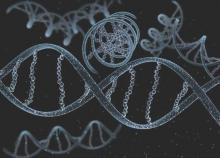A genetic link between elevated triglycerides and coronary heart disease has been identified, opening up the possibility of a new treatment target.
Two separate studies have linked mutations in a gene associated with inhibition of the enzyme lipoprotein lipase – which reduces circulating triglycerides – to lower triglyceride levels and a lower risk of coronary artery disease. Both were published online on March 2 in the New England Journal of Medicine.
The first study reported the sequencing of the angiopoietin-like 4 (ANGPTL4) gene, which is responsible for a protein that inhibits the action of lipoprotein lipase.
One known mutation in this gene, the E40K variant, has previously been associated with decreased triglycerides and elevated HDL cholesterol, but its impact on coronary artery disease risk was unclear.
This sequencing, using samples from 42,930 predominantly European individuals, found the 17 (0.04%) participants who were homozygous for E40K had 13% lower triglycerides levels and 7% higher HDL cholesterol, compared with those without the mutation.
E40K mutation carriers also had a 4% lower risk of coronary artery disease per allele, compared with noncarriers, after adjustment for age, sex and ancestry.
In the same study, researchers looked at the effect of a monoclonal antibody against ANGPTL4 in five obese rhesus monkeys with dyslipidemia.
The treatment was associated with a 60% reduction in circulating triglyceride levels from baseline in four of the five monkeys and a 95% reduction in one monkey (N Engl J Med. 2016 Mar 2. doi: 10.1056/NEJMoa1510926).
“Our data support ANGPTL4 as a therapeutic target for inhibition through an antibody or other mechanism for reducing the risk of cardiovascular disease in humans,” wrote Dr. Frederick E. Dewey of the Regeneron Genetics Center, Tarrytown, N.Y., and coauthors.
Researchers also checked for evidence of the intestinal and mesenteric lymphadenopathy – which had been noted in some preclinical trials of the ANGPTL4 antibody – in individuals with the E40K mutation that inactivates ANGPTL4 – but found no increase in incidence, compared with noncarriers.
The second study reported on the DNA genotyping of 13,715 genes in 72,868 individuals with coronary artery disease and 120,770 controls without heart disease.
This revealed significantly increased risk associated with variants in the LPA and PCSK9 genes, both of which have previously been associated with coronary artery disease, but a significantly decreased risk of coronary artery disease associated with the same E40K variant of ANGPTL4 found in the first study.
When researchers looked at the effect of these variants on risk factors for coronary artery disease, they found the E40K variant was associated with significantly lower triglyceride levels and significantly higher HDL cholesterol levels per copy of the allele (N Engl J Med. 2016 Mar 2. doi: 10.1056/NEJMoa1507652).
Given the relationship between ANGPTL4, lipoprotein lipase, and heart disease risk, researchers postulated that mutations resulting in decreased function of lipoprotein lipase would increase triglyceride levels and the risk of coronary artery disease.
They identified a loss-of-function mutation in the lipoprotein lipase gene that was associated with an increased risk of coronary artery disease, and a gain-of-function mutation in the same gene that appeared to decrease the risk.
“Our results highlight LPL [lipoprotein lipase] as a significant contributor to the risk of coronary artery disease and support the hypothesis that a gain of LPL function or loss of ANGPTL4 inhibition protects against the disease,” wrote Dr. Nathan O. Stitziel of Washington University, St. Louis, and coauthors.
The first study was supported by Regeneron Pharmaceuticals. Several authors declared employment, stock holdings, institutional funding, and other support from Regeneron. One author declared a patent holding for an ANGPTL4 antibody, and five authors had no conflicts of interest to declare.
The second study’s authors declared a range of supporting grants and awards. Conflicts of interest declared included employment with and funding from pharmaceutical companies but many authors also reported no conflicts of interest.


